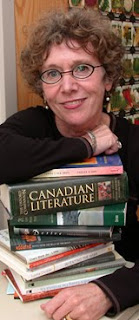
The Blue Hour of the Day
Selected Poems
by Lorna Crozier
McClelland & Stewart
Toronto, Canada
Copyright © 2007 by Lorna Crozier
ISBN: 978-0-7710-2468-9
Softbound, 251 pages, US $17.95
Review by Zvi A. Sesling
Every once in a while I get lucky, like recently in Vancouver where unable to find a small independent bookstore I settled on a Chapters, a national chain in Canada. On the second floor of this attractive and bright light store there was an information person scurrying about so I stopped her in the History section and asked about local poets. She took me to the Poetry section and handed me five or six books. After perusing them I chose Lorna Crozier’s The Blue Hour of the Day, Selected Poems. The woman who had helped me seemed very pleased, “You know, in my opinion, you have picked Canada’s best poet,” she said. She may well be right, even if I am unfamiliar with many Canadian poets.
Crozier has published fourteen books of poetry and in Selected Poems nine of those volumes are represented. They showcase a poet of immense talent with a keen eye for familial relations, love and grief, coupled with humor every reader will relish. There are also very sexy poems, which women seem to make more engaging, enough so to tingle flesh.
Of the some 140 poems in the selection, there are so many that I like I will mention only two or three in this review, though each poem in from The Sex Lives of Vegetables is a gem of observation and humor.
Crozier also writes of the pain of relationships as in “A Man And A Woman” where the prairie is marriage, drought their lives together and rain...
Wind blows from the west.
In a double bed a man and woman
lie side by side, pretending sleep.
Breathe in, breathe out.
When he feels me move, he rolls over,
turns his face to the wall.
Why don’t I tell him it’s okay?
I know he’s awake, I can’t
touch him, can’t speak.
My hand would have to separate
from my body to reach for him.
A country lies between us, a prairie
winter; years and years of drought.
When did it begin?
Wind blows from the west.
Surely even in this dusty room,
this marriage bed,
the small rain down will rain.
Here the frustration, years of boredom and the feeling of being trapped are vented, yet there is always hope.
Crozier also has opening lines that make a reader want to read on. In “Nothing Missing”
four lines engage instantly: Mother and I wait for my father/who has gone into the labyrinth of rooms/where life and death dance like angels/ on the tip of the doctor’s tongue.
There is “Without Hands” which the poet dedicates to the memory of Victor Jara whom she notes was a Chilean musician whose hands were smashed by the military to stop him from playing his guitar and singing for his fellow prisoners in the Santiago stadium [where he and others died in 1973]: All the machines in the world/stop. The textile machines, the paper machines,/the machines in the mines turning stone to fire./Without hands to touch them, spoons, forks and knives/forget their names and uses, the baby is not bathed,...
Oh yes, I love this book for all the wonderful poems Lorna Crozier has written over the years, for the honesty and images that have inspired poets and will continue to do so for future generations of poets. Highly recommended.








_w.jpg)













































